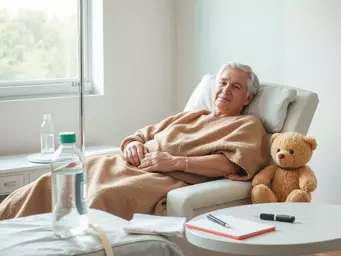Support Resources During Chemotherapy
By Dr. Elise Carter / Jan 28
Have you considered how the side effects of chemotherapy might alter your day-to-day life? Understanding the nuances of Chemotherapy-Induced Peripheral Neuropathy (CIPN) can significantly impact your quality of life during treatment.
Understanding the dual impact of Chemotherapy-Induced Peripheral Neuropathy (CIPN) and effective strategies for managing its symptoms.
CIPN impacts physical, emotional, and social well-being.
Proactive self-care can significantly alleviate symptoms.
Prompt medical attention is crucial for worsening symptoms.
Active participation in healthcare decisions empowers patients.
Chemotherapy can be a critical part of cancer treatment, but it also comes with its challenges, one of which is Chemotherapy-Induced Peripheral Neuropathy (CIPN). This condition affects the nerves and can lead to various sensations, such as tingling, pain, or numbness in the hands and feet. Understanding CIPN is essential for patients and their families, as it can significantly impact the quality of life during and after cancer treatment. Have you ever wondered how these side effects might affect your daily activities?
By diving deeper into what CIPN is, we can better navigate this often-overlooked area of cancer care. Recognizing the signs and symptoms is crucial in addressing CIPN effectively. In this section, we will explore the importance of understanding CIPN and its implications for those undergoing chemotherapy.
CIPN is a condition that arises from the neurotoxic effects of certain chemotherapy agents. It predominantly affects the peripheral nerves, which are responsible for transmitting sensory information to and from the brain. Patients may experience symptoms ranging from mild discomfort to debilitating pain. It's vital to communicate any changes in sensation to your healthcare team, as they can provide guidance and support tailored to your needs. More detailed information on managing this condition can be found in resources such as the Journal of Clinical Oncology.
Awareness and education about CIPN can empower you to advocate for your health. Understanding the nature of this condition is the first step toward effective management and relief.
Addressing CIPN is integral to providing comprehensive cancer care. Many patients may hesitate to discuss their symptoms due to fear of judgment or the stigma associated with cancer-related side effects. However, acknowledging and managing these symptoms is essential for improving overall well-being and treatment adherence. Have you thought about how CIPN might change your experience with chemotherapy? The GW Cancer Center offers valuable insights into the prevention and management of CIPN in adult survivors.
By actively addressing CIPN, you can take charge of your cancer journey, ensuring that your treatment experience is as positive as possible.
The side effects of chemotherapy extend beyond physical symptoms; they can also affect emotional and psychological well-being. CIPN can lead to feelings of anxiety or depression, impacting your ability to engage with your treatment fully. It's normal to feel overwhelmed when experiencing these side effects, but you're not alone in this journey.
Recognizing the broader impact of CIPN is essential for developing a comprehensive approach to treatment. Remember, reaching out for help is a sign of strength, and discussing these feelings with your healthcare team can open the door to more tailored strategies for support.
Understanding the origins of CIPN can help patients and their families better navigate this condition. In the next section, we will discuss the chemotherapy agents linked to CIPN development and the various risk factors contributing to it.
How has Chemotherapy-Induced Peripheral Neuropathy (CIPN) impacted your daily life or that of a loved one? Share your experiences with us below:
Coping with Chemotherapy-Induced Peripheral Neuropathy (CIPN) can be challenging, but there are practical self-care tips that can make a significant difference in managing symptoms at home. It's essential to take an active role in your care and adopt strategies that support your well-being. Let's explore some effective self-care techniques that can help enhance your quality of life.
Creating your own symptom tracker is another effective way to monitor how you feel and identify any patterns. By documenting your symptoms, triggers, and what seems to help, you can share valuable insights with your healthcare team. This active involvement not only enhances your understanding but also empowers you in your treatment journey.
Your symptom tracker can be as simple as a notebook or a digital app. Include the following elements:
Using this structured approach allows you to take charge of your experience and fosters open discussions with your healthcare providers. Have you thought about how keeping track of your symptoms could lead to better management strategies?
Living with CIPN often feels isolating, but connecting with others who understand can be incredibly beneficial. Engaging with support groups and online communities provides not only emotional support but also practical advice from those who have navigated similar challenges. Remember, you are not alone in this journey!
These resources not only provide a sense of community but also valuable information on managing CIPN symptoms. Have you explored any local or online resources that resonate with you? Finding your community can be a game-changer in your cancer journey!
Here are some common questions about Chemotherapy-Induced Peripheral Neuropathy (CIPN):
As you navigate living with CIPN, knowing when to seek professional help is crucial for your health and well-being. While self-care is important, there are times when consulting a healthcare provider becomes necessary.
If symptoms become more severe or change significantly, it's vital to consult your neurologist. Signs that warrant professional attention include:
Staying vigilant about changes in your symptoms can lead to timely interventions and adjustments in your treatment plan. Don't hesitate to reach out for help!
Open dialogue with your healthcare team is essential. It's okay to voice your concerns and ask questions about your CIPN symptoms. Advocate for yourself by:
By fostering a collaborative relationship with your healthcare providers, you're taking steps to ensure that your treatment plan is tailored to your needs. How empowered do you feel when you take an active role in your healthcare decisions?
As you manage CIPN, it's important to know where to find reliable information and support that can enhance your understanding of treatment options. At Types of Chemotherapy, we strive to provide you with valuable resources that empower you in your journey.
By utilizing these resources, you can stay informed and equipped with knowledge to help navigate your experience.
Oncology nurses play a crucial role in the management of CIPN. They provide support through:
Connecting with oncology nursing professionals can significantly enhance your care experience. Have you considered reaching out to an oncology nurse for specialized support?
Here is a quick recap of the important points discussed in the article:



 Support Resources During Chemotherapy
Did you know that support resources can significantly ease the journey through chemotherapy? Underst
Support Resources During Chemotherapy
Did you know that support resources can significantly ease the journey through chemotherapy? Underst
 Supporting Mental Health in Chemotherapy
When you think about cancer treatment, how often do you consider the emotional toll it takes on pati
Supporting Mental Health in Chemotherapy
When you think about cancer treatment, how often do you consider the emotional toll it takes on pati
 Chemotherapy's Impact on Relationships
Have you ever considered how a cancer diagnosis can reshape the relationships around you? The emotio
Chemotherapy's Impact on Relationships
Have you ever considered how a cancer diagnosis can reshape the relationships around you? The emotio